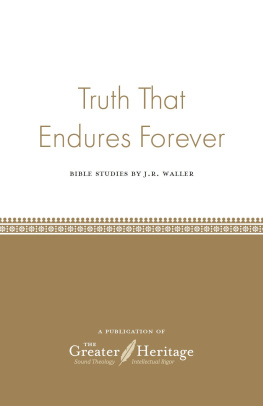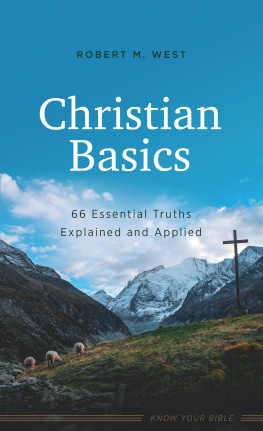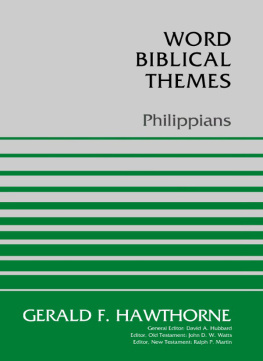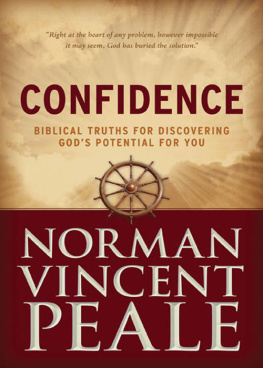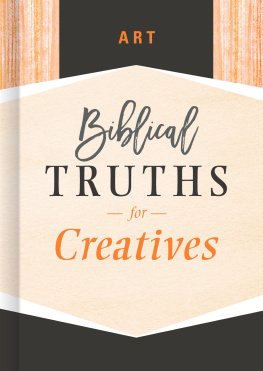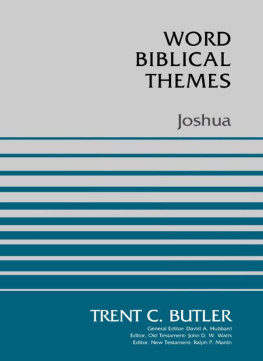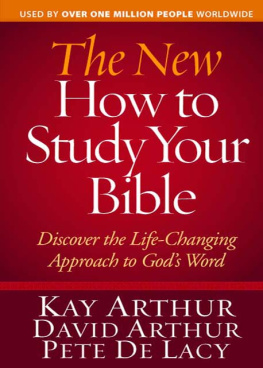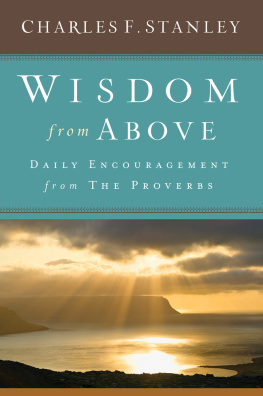
Truth That Endures Forever: Bible Studies by J.R. Waller
First Edition (November 2020)
2020 by Jeremy Waller
All rights reserved. No part of this book may be reproduced in any form without written permission from the publisher. Exceptions apply for brief quotations used for reviews and/or articles.
Unless otherwise noted, all scripture is taken from the Kings James Bible (KJV).
Published by
The Greater Heritage
1170 Tree Swallow Dr., Suite 309
Winter Springs, FL 32708
(407) 431-0587
Email:
Website: www.thegreaterheritage.com
Twitter: @TGH_Ministries
Cover Design: Rakel Fairfull
Font(s): EB Garamond, MrsEavesPetiteCaps
ISBN (paperback): 978-1-953855-00-8
ISBN (PDF): 978-1-953855-01-5
ISBN (EPUB): 978-1-953855-02-2
ISBN (KINDLE): 978-1-953855-03-9
O praise the LORD , all ye nations: praise him, all ye people. For his merciful kindness is great toward us: and the truth of the LORD endureth for ever. Praise ye the LORD . (Psalm 117:1-2)
Table of Contents
Introduction
One of the most comforting things about God is that He never changes. (Jas. 1:17) Jesus is the same yesterday, and today, and forever. (Heb. 13:8) What is more, not only do His nature and attributes remain the same, His words and truths are equally unchanging.
I cannot think of anything more reassuring than that. In a world where mankind runs rabid trying to devise his own answers to matters both lofty and small, we have the very Word of God at our fingertips. In it are all the answers to life.
At some point, this author needs to write a book with a single theme running through it (Im working on that as we speak, so stay tuned). Yet, this collection of Bible studies, though each a bit different in scope and topic, share a single profound commonality. They each present us with truths from Gods Word that will never change.
You can pick up this book today, read it, glean from it and never fear that its words will become outdated, out of fashion or inapplicable to your life. Before you jump into the main text, I wanted to point out a few things.
For those who have read some of The Greater Heritages previously published works, youll notice that this volume is a little different.
First, it is better organized. We spent a lot of time and energy professionally typesetting and printing this volume, and it shows! We cannot thank the folks at E.O. Painter Printing Company (Florida's oldest continuously operating printing company ) enough.
Second, the studies (chapters) are listed alphabetically. Since each one stands on its own, we thought this would be a nice approach.
I hope that the lessons herein are as great a blessing to you as they were to me when I wrote them. I find it a tremendous blessing and responsibility that God would have me communicate His everlasting truths to you through the written word.
It is not something I ever take lightly. In fact, I often question my worthiness for such a monumental task. However, I am just a vessel, God does the work and He is to receive the glory.
To conclude, I want to thank my Lord and savior Jesus Christ, my wonderful parents, friends and church community for helping me with this book. You know who you are, but you have no idea just how much you mean to this author.
Soli Deo gloria!
-J.R. Waller, September 2020
Acceptable to God, Approved of Men
Key point: Unity among believers is not an unattainable ideal but a reachable reality.
For the kingdom of God is not meat and drink; but righteousness, and peace, and joy in the Holy Ghost. For he that in these things serveth Christ is acceptable to God, and approved of men. (Romans 14:17-18)
Christians have had differences of opinion since the early days of the church. Not long after Jesus ascended mankind began to re-interpret and misconstrue doctrines to satisfy agendas. In fact, Paul corrected practices and doctrines throughout many of his letters.
Our lesson today focuses not on differences over foundational doctrines but on preferential differences among Christians and how to maintain unity in the presence of them. These are also known as matters of conscience or personal conviction.
Life is gray, things such as Church structure, style of worship, and Christian behavior all have varying degrees of definition and application, not to mention differences across cultures.
Before we get into todays lesson though, we will look at differences concerning foundational doctrines. In so doing we will see how they are contrasted with differences of preference.
The primacy of doctrine
There are things Christians are not to compromise on. These are the core doctrines of the Bible. In fact, this is why at The Greater Heritage we have a Basic Statement of Faith on our site. Our statement outlines Christian doctrines that we (as well as most mainline denominations) deem to be not only vital but also essential and non-negotiable to Biblical Christianity.
Denominations, churches and ministries adhere to similar statements of faith. Creeds, catechisms, mission statements, vision and value statements and statements of faith all set forth core doctrines that Christian ministries and churches will not compromise on.
If these doctrines were altered from what scripture clearly teaches, it would turn Christianity into something it is not. Most well-meaning mainline ministries and denominations share similar core beliefs and doctrines.
Core, foundational and essential doctrines are those that are clearly articulated in the Bible and central to the faith. For example, God created man, man is inherently sinful, Jesus is the only way to God, salvation is all of grace and not of works, scripture is inspired and final, etc.
These are some of the most common and essential Christian doctrines. Denominations differ in terms of secondary doctrines such as the timing of Jesus return, the use and gifts of the Holy Spirit, use and style of worship, and church structure for instance. Nevertheless, even though differences may exist on secondary doctrines they do not alter the core of what Christianity is.
Despite the differences those who hold to them are most usually sincere, well-meaning and true believers. Therefore, Christians need not break fellowship over differences of secondary importance.
Cults and the altering of core doctrines
However, we must respond very cautiously when a group or individual espouses clearly non-Biblical teachings related to core doctrines. There is a great problem when people alter core doctrines. This is especially true when done to fit someones own interpretations or agenda. We are to beware such things:
Beware lest any man spoil you through philosophy and vain deceit, after the tradition of men, after the rudiments of the world, and not after Christ. (Colossians 2:8)
Altering doctrine to fit mans own view creates nothing more than a lifeless and false religion. It is a religion devoid of Christ and His saving grace. Religions like these are after the tradition of men and the rudiments of the world. Paul is quite clear that these belief systems are not after Christ.
Many cults do this. A cult is any institution proclaiming to be Christian that also adds to or takes away from Biblical doctrines to the extent that they do not teach a Biblical Christianity and therefore adopt a false Christianity.

